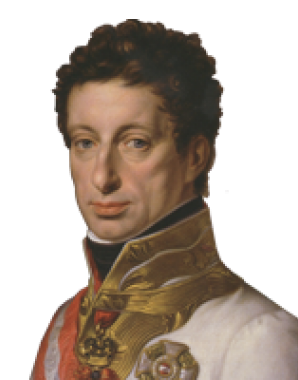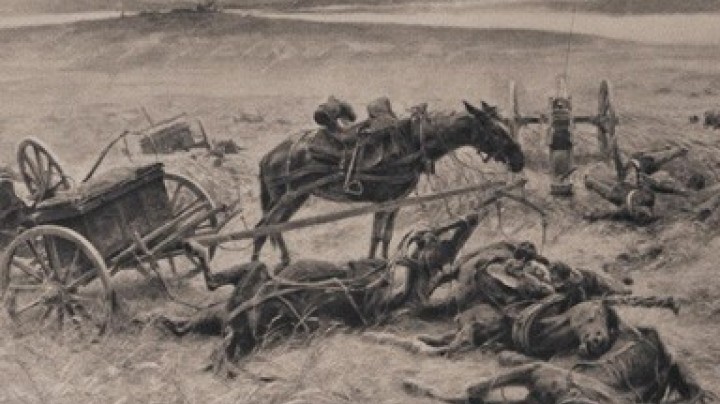Archduke Albrecht, the eminence grise
Archduke Albrecht was the eminence grise in the circle around Emperor Franz Joseph. His military successes had secured him a position of authority at the Viennese Court. As a proponent of anti-liberal principles he stood in sharp contrast to those who supported the idea of transforming the Monarchy into a constitutional state, and to the liberal course represented by Crown Prince Rudolf.
Born in Vienna on 3 August 1817, Albrecht was the second child of Archduke Karl and Henriette of Nassau-Weilburg. As the son of the ‘Victor of Aspern’, he was evidently influenced by the military ideals that prevailed in the paternal household and was keen to emulate his father.
The young archduke displayed definite gifts in this field: more talented than most of the male scions of the dynasty for whom a military career was obligatory, he was soon regarded as the strategic hope of the dynasty. He was hastily prepared for a future high-ranking position and promoted to colonel of an infantry regiment while still a young man. Trained in all things military by his father, who was regarded as an authority, he rose rapidly through the ranks.
His hostile attitude towards liberal tendencies manifested itself early on in his career. As the commanding officer for Lower Austria and Vienna he resigned in 1848 when the Court rejected his demands to suppress the incipient revolution by force of arms.
The stand that Albrecht took impressed the young emperor Franz Joseph, who also wanted to use arms to counter the revolutionary forces. In Albrecht he saw a major supporter of his neo-absolutist policies. The young emperor entrusted the archduke with high-ranking offices in the military and civil administration. Thus when Hungary was restored to Austrian rule – solely thanks to Russian military aid – after the War of Independence in 1848/49, the archduke was appointed governor in order to ‘pacify’ the country along Habsburg lines from 1851 to 1860.
Albrecht’s position as the military authority of the dynasty was reinforced by his victory at the Battle of Custozza in 1866 against Garibaldi’s army, which was fighting for the unification of Italy. As a sign of recognition, Franz Joseph, who showed little talent himself as a military commander, appointed his much-admired relative as General Inspector of the Imperial and Royal Army. Albrecht thus became the most senior decision-maker in military matters.
Albrecht’s political views were shaped by an uncompromising rejection of liberalism. His conservative principles also made him a dangerous opponent of Crown Prince Rudolf. The two men harboured a dislike for each other which neither bothered to conceal.
Albrecht retained his high-ranking position into old age, even though he became virtually blind towards the end of his life. The elderly archduke thus became a symbol of the stagnation and ossification at the Viennese Court during the latter part of Franz Joseph’s reign.
As his marriage to Hildegard (1825–1864), daughter of King Ludwig I of Bavaria in 1844 had remained without male issue, he adopted the three sons of his brother, Archduke Karl Ferdinand.
The eldest boy, Archduke Friedrich (1856–1936), became the wealthiest Habsburg of his time, thanks to his inheritance from his uncle and adoptive father Albrecht and his personal financial talents. When the First World War broke out he was given nominal supreme command of the Austro-Hungarian armed forces. However, he was principally occupied with official duties, as Field Marshal General Conrad von Hötzendorf assumed actual command over the troops. Friedrich was unflatteringly memorialized by Karl Kraus in his Last Days of Mankind as the blasé and inane ‘Archduke Bumsti’.
Albrecht had two daughters of his own. The elder of the two, Maria Theresia (1845–1927), married Duke Philipp of Württemberg and lived with her family in the Ringstrasse palace today known as the Hotel Imperial. The younger daughter Mathilde (1849–1867) was killed in a tragic accident: fearing she would be discovered smoking, she hid a lit cigarette under her dress, which then caught fire. The young archduchess died from severe burns at the age of only eighteen.
Archduke Albrecht died at his villa in Arco (then part of Tyrol, today in the Province of Trentino, Italy) on 18 February 1895. He is commemorated by the equestrian statue that stands on the Augustinerbastei in front of his Viennese palace, today known as the Albertina.
















